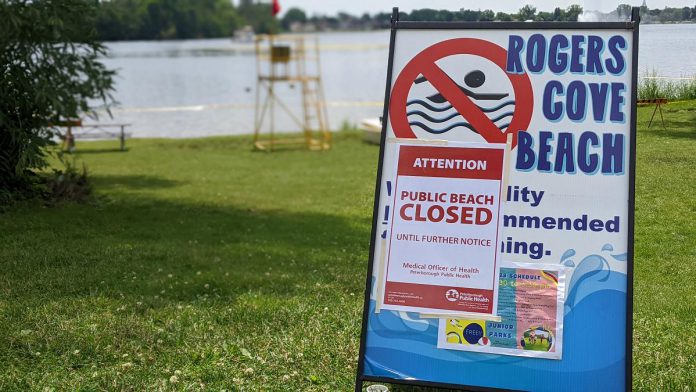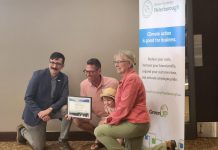
Peterborough Public Health is advising residents and visitors that a harmful blue-green algae bloom has been confirmed off the beach at Rogers Cove in Peterborough’s East City, and that both the Rogers Cove beach and the beach at Beavermead Park will remain closed to protect the health and safety of the public and pets.
On July 14, the health unit first closed the beaches at both Rogers Cove and Beavermead Park after observing possibly harmful blue-green algae blooms in the water while preparing to collect water samples for its daily water testing.
The Ontario Ministry of Environment, Conservation and Parks subsequently sampled water at the Rogers Cove beach for testing. On Friday (July 21), the ministry confirmed the presence of a harmful blue-green algae bloom in the sample and, on Monday, confirmed the sample had a total microcystin toxin amount of 169 micrograms per litre, exceeding Health Canada’s recreational water limit of 10 micrograms per litre.
The ministry will collect additional samples from both beaches on Monday, with testing results expected by the end of the week.
“More samples will be collected and sent for analysis today,” says Julie Ingram, manager of environmental health with Peterborough Public Health, in a media release. “It is important to get the beaches reopened as soon as it’s safe to do so, especially with the hot weather that is in the forecast.”
While Peterborough Public Health says there is no immediate risk to Peterborough or Lakefield’s municipal drinking water supplies, the health unit warns that exposure to toxins through activities like drinking, swimming, and bathing can cause illness and discomfort. Common symptoms include itchy, irritated eyes and skin, rash, headache, fever, diarrhea, abdominal pain, nausea, and vomiting.

Pets and farm animals that consume contaminated water may experience sickness or death.
The risk to humans is primarily from drinking water that has been contaminated with toxins from a dense harmful algae bloom. Long-term consumption of water containing high levels of cyanobacterial toxins may cause neurological or liver problems.
The health unit is encouraging residents downstream of Little Lake to monitor water for the presence of blue-green algae. Dense blue-green algae blooms can make the water look like a bluish-green pea soup, or a shiny paint slick. Fresh blue-green algae blooms often smell like fresh-cut grass, while older blooms can have a strong septic- or garbage-like odour.
To report a suspect blue-green algae bloom, residents should contact the Ministry of Environment, Conservation and Parks Spills Action Centre at 1-800-268-6060.
If algae blooms are visible, the health unit advises:
- Do not use the water for drinking, food preparation, bathing, showering, or swimming use.
- Do not allow children, pets, or livestock to swim in or drink the water.
- If skin contact does occur, wash with soap and water or rinse thoroughly with clean water to remove the algae.
- Do not boil the water. Boiling will not remove the toxins and may release more of the toxin into the water.
- Residents should avoid cooking with the water because food may absorb toxins from the water during cooking.
- Fishing is generally considered safe and there is low risk to human health from eating fish caught during a peak blue-green algal bloom condition.
- Be aware that home treatment systems for water may not remove toxins and may become clogged.
- Do not treat the water with a disinfectant such as chlorine bleach. This action may break open algal cells and release toxins into the water.
For more information on blue-green algae, visit peterboroughpublichealth.ca/blue-green-algae/.


























